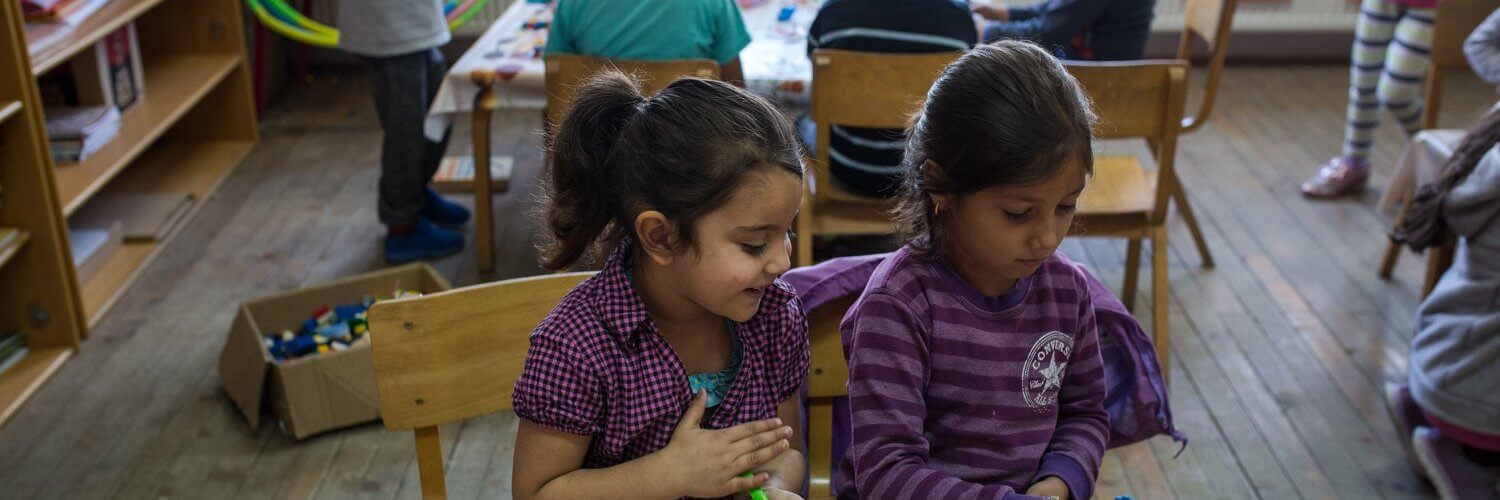Roma children in Serbia face significant disadvantages hampering their early development. R4D evaluated the Open Society Foundations’ parenting support program, Strong from the Start, to measure impact on parents and children, and to build evidence on early childhood development programs
The Challenge
The earliest years of a child’s life are marked by extraordinary periods of physical, emotional and mental growth. For children growing up in adverse living conditions, a lack of positive early experiences and quality parenting can adversely affect their development, health and well-being, and readiness for school. Early childhood interventions, including efforts to improve parenting quality, can mediate these unfavorable early experiences and serve to support children’s optimal development, with the greatest benefit to vulnerable children.
Children from the Roma community in Eastern Europe tend to be at a greater developmental disadvantage than their peers. Serbia is home to a significant Roma population who were nationally recognized as a minority in 2002. According to the 2011 census, 2.1% of the Serbian population is Roma. However, like many other countries in Eastern Europe, the true Roma population is believed to be 2-4 times higher (UNDP, 2006). The Roma have been historically marginalized, living in higher rates of poverty and with poorer access to health, sanitation, infrastructure, and educational opportunities.
Disparities between the Roma and the general population start early, and these early disadvantages are hard to overcome – only 64% of Serbia’s Roma students complete primary school, compared to 93% of their non-Roma peers. Without a basic education, Roma children are likely to be under employed.
With these challenges in mind, Open Society Foundations (OSF) launched the Roma Early Childhood Development and Education Initiative in Serbia. This initiative pilots community-based services to improve the quality of parenting support services and early childhood education and care.
The Opportunity
OSF’s programming for parents and young children in Serbia went through a thorough development and piloting phase, and the team feels they are now ready to be tested for impact on parenting practices and child school readiness. The projects are implemented by Romanipen and the Centre for Interactive Pedagogy (CIP Centre) in Serbia.
The main project, “Strong from the Start – Dam Len Phaka – Let’s give them wings” seeks to improve parental competencies for early childhood development, education and social inclusion of Roma preschool children. The “Strong from the Start” workshops will engage parents and other caregivers in the early education of their children over an 18-month period. The program seeks to build Roma parents’ skills and competencies, so they can support their children and give them the best start in life.
OSF has selected Results for Development to conduct an evaluation of “Strong from the Start,” covering the community workshops and home visits.
Our Work
The R4D team brings together strong evaluation and child development expertise to assess the efficacy of “Strong from the Start.” In partnership with Deep Dive, a research and data collection firm in Belgrade, and researchers from the University of Belgrade, R4D will ensure that a culturally relevant and sensitive quasi-experimental impact evaluation is implemented with rigor and quality. R4D will measure the impact of the program on parenting and child outcomes through these analyses and liaise with the implementing organizations to validate and discuss preliminary findings.
The evaluation is conducted in two parts: a process evaluation and an impact evaluation. The process evaluation aims to document program implementation and fidelity to the program model. Deep Dive will work with local organizations Romanipen and CIP Centre, and the 15 program sites to better understand how the program was implemented. The child assessment tool for this evaluation is adapted from Save the Children’s International Development and Early Learning Assessment, or IDELA.
This evaluation seeks to not only assess the program’s efficacy, but also add to the global evidence base around early childhood development, and parenting programs for marginalized communities. Despite the expanding set of knowledge in ECD and parenting interventions, there are still notable gaps. The body of literature about Roma communities and parenting interventions is particularly sparse. The R4D team hopes to expand the literature base around scaling parenting programs.














